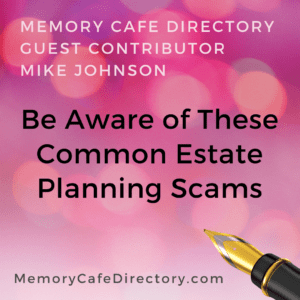Memory Cafe Directory posts and/or links to retailers can be advertising, sponsored, or affiliate links. We may earn a small commission from them. Thank you.
Be Aware of These Common Estate Planning Scams
Submitted by Guest Contributor:
Mike Johnson
Whenever there is a significant amount of money involved, you can be sure there are plenty of scammers lurking in the shadows waiting to take advantage of the vulnerable. Unfortunately, estate planning is one of the areas that tend to attract some of the more unsavory characters of the world – particularly those who make a living from preying on the elderly.
The sad truth is that the real estate scam business is booming as of late. As house prices continue rising and the value of estates skyrocket, it’s imperative that you stay on your toes to ensure that you do not fall victim to one of the many swindles in the estate planning industry.
What Is Estate Planning?
Estate planning is the process of deciding who will inherit your assets and take care of your responsibilities when you die or become incapacitated. One of the primary objectives is to guarantee that your assets are distributed in such a way that estate, gift, income, and other taxes are minimized and so that there is no chance for conflict between your heirs over how your wealth is distributed. Your estate plan is typically drafted with the help of an attorney or advisor who will help guide you through the process – this is normally the area where scammers try to manipulate their victims.
Why Are Seniors The Primary Targets?
Adults aged 50 years and over tend to be the primary targets of estate planning fraud – especially those with no close relatives. Shockingly, the Consumer Financial Protection Bureau estimates that victims of financial fraud over the age of 50 lose an average of $34,200 to opportunistic con artists. Individuals who fall within this demographic may be more vulnerable to these scams for a variety of reasons, including:
- Adults over 50 tend to have more significant assets and higher net worth.
- Many people within this demographic are unfamiliar with the estate planning process, making them easier targets for scams.
- Elderly people may lack the cognitive ability or decision-making abilities that are required to make informed choices and avoid scams.
- Many older adults are at increased risk for loneliness and social isolation. Socializing improves cognitive abilities and the lack of social interaction leads to poor decision making and makes the elderly vulnerable to dangerous situations.
As you can imagine, falling victim to a scam of this sort can leave your family devastated when none of them receive the assets they were promised. Estate planning fraud can rip families apart and truly crush those close to the deceased, especially in a time that is supposed to be reserved for grieving.
Types Of Estate Planning Scams
With all of that said, let’s take a look at some of the most common estate planning scams that you should be aware of when planning your affairs.
Living Trust Mill Scams
This is when scammers pressurize people into paying for living trusts whether they need them or not. Scare tactics are commonly used in these scams to get victims to pay money. The best approach to determine if you require a living trust is to consult with an experienced attorney to analyze your unique circumstances.
Cold Calls Offering To Prepare Estate Plans
Estate planning con artists frequently cold call through direct solicitation such as mailers, door-to-door sales, and telemarketing. These organizations commonly utilize names that seem highly legitimate and are easily mistaken for other well-known organizations such as AARP.
Estate Planning “Templates”
Many people prefer to go the DIY route when planning their estate; however, that may not always be the wisest decision. Many websites offer estate planning templates, but these templates are seldom tailored to satisfy state-specific laws and sometimes fail to include contingencies required for a full and complete estate plan.
Self-help Living Trust Kits
Similarly to the estate planning templates, self-help living trust kits do not offer consumers the information or resources they need to effectively administer their estates, making them highly prevalent scams in the industry.
IRS Scams
There are a number of different IRS imposter scams out there where individuals impersonate government officials in an attempt to get you to hand over private information or to pay fees attributed to your estate.
How To Avoid Estate Planning Scams
Now that you know some of the most common forms of estate planning scams, here are a few tips and tricks to help you avoid falling victim to this type of fraud. That way, you can keep your wealth intact and ensure that your assets will be distributed to your heirs as per your wishes once you have passed.
Ask About Qualifications
Don’t be afraid to ask questions when dealing with an estate planning attorney. Feel free to ask any “professional” you deal with about their qualifications and seek extra verification if you are still unsure. The goal here is to ascertain you’re consulting with an experienced and verified estate planning attorney who is licensed to practice law in your state.
Investigate Direct Solicitations
If anybody contacts you directly, you should proceed with extreme caution. Direct solicitations are the most common way for scammers to initiate contact, so you must conduct due diligence by searching the company online to verify its reputation and the type of work completed.
Purchase Additional Products Carefully
Some attorneys offer additional phony products that offer little or no value but end up costing you a lot of money. These usually produce high commissions for the scammer, so always be on high alert when extra products are mentioned.
Watch Out For Deals That Are Too Good To Be True
As the saying goes, if it’s too good to be true, it usually is. Another major red flag is when an attorney comes to you with offers that seem way out of the normal ballpark. Especially if they promise that you can completely avoid taxation or eliminate fees entirely. There’s always a catch.
Speak With An Experienced Estate Planning Lawyer
The best way to be safe is to contact a trusted and experienced estate planning lawyer directly. Do not wait for a solicitation. Research and read the reviews of estate planning attorneys in your area and contact them directly.
Don’t Execute Documents You Do Not Understand
Frequently scammers attempt to deceive and overwhelm the elderly into signing documents that they do not understand. When this happens, it’s usually to the detriment of your estate and your heirs.
Be Cautious Of Paying Exorbitant Legal Fees
Some attorneys attempt to charge exorbitant fees when it is simply unwarranted. This can be during the estate planning process, or once you have passed – upon which the attorney will try to charge your heirs fees even though you crafted a well-prepared estate plan. Make sure you get a clear outline of all the fees beforehand and get it in writing.
If Pressured To Take Action, It’s Probably Scam
Scammers often resort to pressure tactics to try and create a sense of urgency to make you sign on the dotted line or hand over your money. If you ever feel an attorney is pressuring you into something too hard, then it’s a good time to step away and find an alternative service. There should be no haste when drafting your estate plan. Take your time to review all of the documentation to ensure that you’re 100% comfortable before making any commitments.
Mike Johnson

Mike Johnson
Mike Johnson is a freelance writer and a human rights activist and an enthusiast. Through his extensive research and commitment to the field of law, Mike has established himself as a well-decorated writer in this field.
Mike currently settles in Las Vegas, and loves starting his day with a shot of espresso and cycling through his neighborhood.
Become a Contributor!
 Do you want to be a Memory Cafe Directory contributor? If you have helpful information to share with our community, read about the guidelines, then get in touch to discuss what you have to offer.
Do you want to be a Memory Cafe Directory contributor? If you have helpful information to share with our community, read about the guidelines, then get in touch to discuss what you have to offer.
Thank you.




